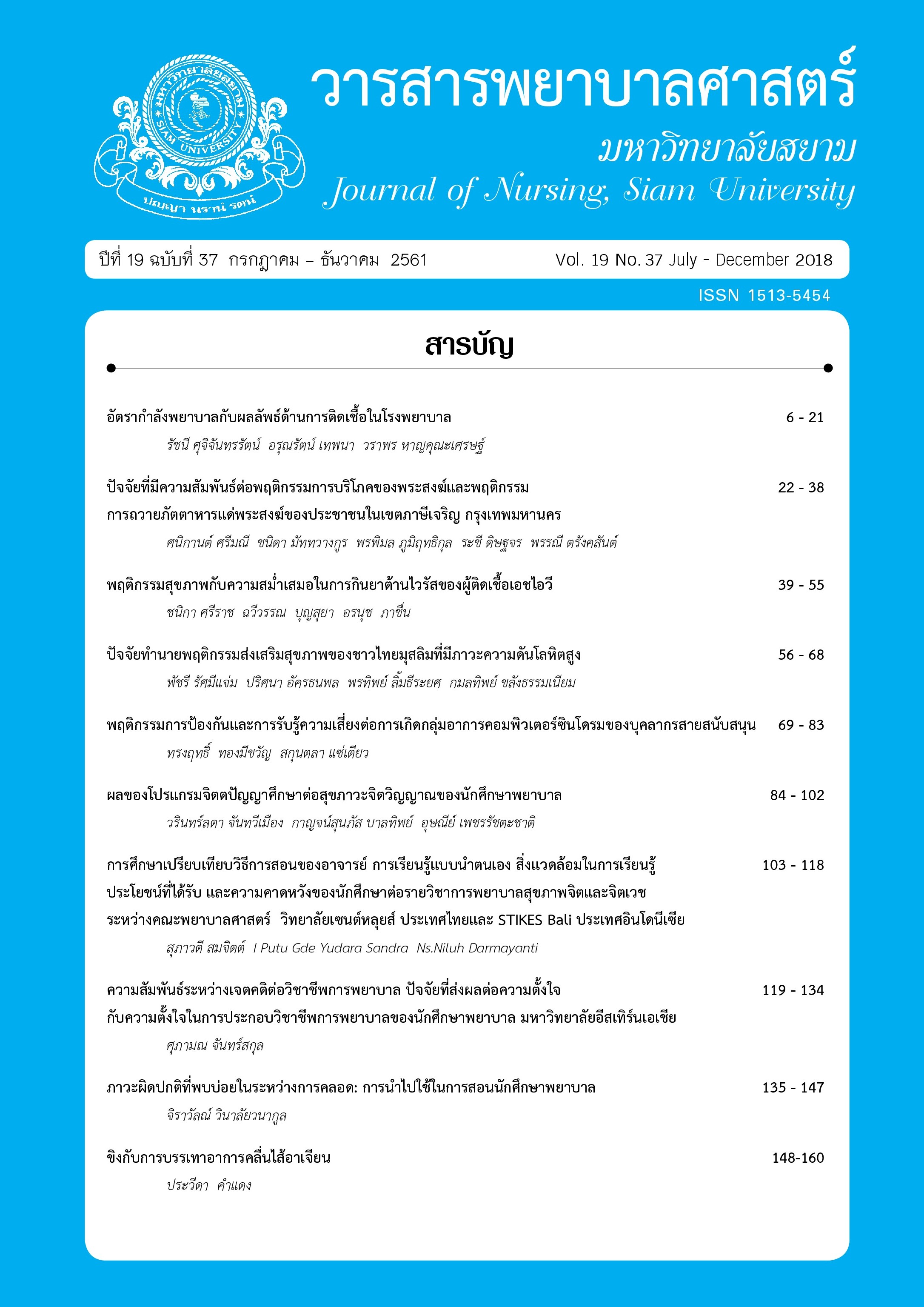ผลของโปรแกรมจิตตปัญญาศึกษาต่อสุขภาวะจิตวิญญาณของนักศึกษาพยาบาล
คำสำคัญ:
นักศึกษาพยาบาล, จิตตปัญญาศึกษา, สุขภาวะจิตวิญญาณบทคัดย่อ
บทคัดย่อ
การวิจัยกึ่งทดลองนี้มีวัตถุประสงค์เพื่อศึกษาผลของโปรแกรมจิตตปัญญาศึกษาต่อสุขภาวะจิตวิญญาณของนักศึกษาพยาบาล คัดเลือกกลุ่มตัวอย่างจากวิทยาลัยพยาบาล 2 แห่งในภาคใต้ โดยการสุ่มแบบหลายขั้นตอนได้กลุ่มทดลอง 40 คนและกลุ่มควบคุม 39 คน กลุ่มทดลองได้รับโปรแกรมเป็นเวลา 8 สัปดาห์โดยทำกิจกรรมเป็นรายกลุ่ม กลุ่มควบคุมได้รับการดูแลตามปกติ เครื่องมือที่ใช้ ได้แก่ โปรแกรมจิตตปัญญาศึกษาและแบบสอบถามสุขภาวะจิตวิญญาณสำหรับนักศึกษาพยาบาลซึ่งผ่านการตรวจสอบความตรงเชิงเนื้อหาและตรวจสอบค่าความเที่ยงกับนักศึกษาพยาบาล 30 ราย ได้ค่าสัมประสิทธิแอลฟาของครอนบาคเท่ากับ 0.84 วิเคราะห์ข้อมูลส่วนบุคคลโดยใช้สถิติเชิงบรรยาย สถิติไคสแควร์ (Chi-square) และไลค์ลี่ฮูดเรโช (Likelihood ratio) และวิเคราะห์ความแตกต่างของคะแนนเฉลี่ยสุขภาวะจิตวิญญาณโดยสถิติที
ผลการวิจัยพบว่ากลุ่มทดลองมีคะแนนเฉลี่ยสุขภาวะจิตวิญญาณหลังทดลองสูงกว่าก่อนทดลองอย่างมีนัยสำคัญทางสถิติ (p<.001) และกลุ่มทดลองมีคะแนนเฉลี่ยสุขภาวะจิตวิญญาณหลังทดลองต่ำกว่ากลุ่มควบคุมอย่างไม่มีนัยสำคัญทางสถิติ (p> .05)
เอกสารอ้างอิง
กรศศิร์ ชิดดี, และณัฐพร อุทัยธรรม. (2556). กิจกรรมจิตตปัญญาศึกษา: กลยุทธ์การพัฒนาบุคลิกภาพนักศึกษาพยาบาล. วารสารมหาวิทยาลัยนราธิวาสราชนครินทร์, 5(2), 106-117.
ฉวีวรรณ สัตยธรรม. (2541). ในอวยพร, สุทิศา, และชลธิชา.(2553).อวยพร ภัทรภักดีกุล, สุทิศา เจริญศิลป์, และชลธิชา ศรุตินันท์.(2553). ความสัมพันธ์ระหว่างปัจจัยที่เกี่ยวข้องการส่งเสริมสุขภาวะทางจิตวิญญาณกับความผาสุกทางจิตวิญญาณ. วารสารเกื้อการุณย์, 17(2), 66-79.
ทัศนีย์ ทองประทีป. (2552). จิตวิญญาณมิติหนึ่งของการพยาบาล. กรุงเทพมหานคร: สำนักพิมพ์แห่งจุฬาลงกรณ์มหาวิทยาลัย.
ธนา นิลชัยโกวิทย์, และอดิศร จันทร์สุข. (2552). ศิลปะการจัดกระบวนการเรียนรู้เพื่อการเปลี่ยนแปลง:คู่มือกระบวนการจิตตปัญญาศึกษา .กรุงเทพมหานคร: เอส พี เอ็น การพิมพ์.
นฤมล อเนกวิทย์. (2552). การพัฒนาหลักสูตรจิตตปัญญาศึกษาสำหรับนักศึกษาพยาบาล.วิทยานิพนธ์ปริญญาศึกษาศาสตร์ ดุษฎีบัณฑิตสาขาหลักสูตรและการสอน มหาวิทยาลัยขอนแก่น, ขอนแก่น.
ปาริชาต ชูประดิษฐ์. (2556). การพัฒนาสุขภาวะทางจิตวิญญาณสำหรับนักศึกษาพยาบาลวิทยาลัยพยาบาลสังกัดสถาบันพระบรมราชชนกกระทรวงสาธารณสุข. ปริญญาปรัชญาดุษฎีบัณฑิต สาขาวิชาบริหารศาสตร์มหาวิทยาลัยแม่โจ้, เชียงใหม่.
ประเวศ วะสี. (2544). สุขภาวะทางจิต: สุขภาวะทางจิตวิญญาณ. หมอชาวบ้าน, 22 (262).
พัชนี สมกำลัง, และมาริสา ไกรฤกษ์. (2552). ความผาสุกทางจิตวิญญาณจากการแสวงหาความหมายของชีวิต: การศึกษาชีวิตฟลอเรนซ์ไนติงเกล ผู้นำทางการพยาบาล. วารสารพยาบาลศาสตร์, 27(3), 24-32.
พิชญ์นรี พิทักษ์อวกาศ. (2556). การศึกษาคุณลักษณะของนักศึกษาพยาบาล วิทยาลัยพยาบาลกองทัพเรือ. ปริญญาการศึกษามหาบัณฑิต สาขาการอุดมศึกษา มหาวิทยาลัยศรีนครินทรวิโรฒ, กรุงเทพมหานคร.
วรวรรณ จันทวีเมือง, อุษณีย์ เพชรรัชตะชาติ, และขวัญตา บาลทิพย์. (2559). การพัฒนาโปรแกรมการสร้างเสริมสุขภาวะจิตวิญญาณสำหรับนักศึกษาพยาบาล. วารสารพยาบาลศาสตร์ มหาวิทยาลัยสยาม. 17(32), 29-41.
วิจักษณ์ พาณิช. (2550). การเรียนรู้ด้วยใจอย่างใคร่ครวญ: การศึกษาดั่งเส้นทางแสวงหาทางจิตวิญญาณ. กรุงเทพมหานคร: สวนเงินมีมา.
ศิริรัตน์ จําปีเรือง, อมรรัตน์ วัฒนาธร, พูลสุข หิงคานนท์, วารีรัตน์ แก้วอุไร. (2556). การพัฒนาหลักสูตรเสริมสร้างคุณลักษณะที่พึงประสงค์ตามกระบวนการสุนทรียสนทนาสําหรับนักศึกษาพยาบาล. วารสารศึกษาศาสตร์มหาวิทยาลัยนเรศวร, 15(3), 9-15.
อุไร หัถกิจ, และวารีรัตน์ ถาน้อย. (2555). การพยาบาลองค์รวมและการดูแลสุขภาพแบบผสมผสาน: การบูรณาการแนวคิดสู่การจัดการศึกษาพยาบาล.วารสารสภาการพยาบาล, 17 (ฉบับพิเศษ), 5-10.
Carson, V. B. & Green, H. (1992). Spiritual well-being : A predictor of hardiness in patient with acquired immunodeficiency syndrome. Professional Nursing, 40(8), 209-220.
Hungelmann, J. A., E. Kenkle-Rossi, L. Klassen and R. M. Stollenwerk. (1987). Development of the JAREL Spiritual Well-Being Scale. In R. M. Carroll-Johnson (Ed), Classifications of Nursing Diagnoses: Proceedings of the 8th Conference. (393-398). Philadelphia: North American Nursing Diagnosis Association. J.B. Lippincott Company.
Paloutzian, R. F., & Ellision, C. W. (1982). Loneliness spiritual well being and quality of life. In Peplan, L. A. & Perlman, P. (Eds.). Loneliness : A sourcebook of current theory research and therapy. New York: Wiley Interscience.
Park , K., B., & Calamaro, C. (2013). A systematic review of social networking sites: Innovative platforms for health research targeting adolescent and young adults. Journal of Nursing Scholarship, 45(3), 256-264.
Tiew, H. L., Creedy, K. D., & Chan, F.M. (2013). Student nurses perspective of spirituality and spiritual care. Nurse Education Today, 33, 574-579.
ดาวน์โหลด
เผยแพร่แล้ว
รูปแบบการอ้างอิง
ฉบับ
ประเภทบทความ
สัญญาอนุญาต
เนื้อหาและข้อมูลที่เผยแพร่ในวารสารพยาบาลศาสตร์ มหาวิทยาลัยสยามถือเป็นข้อคิดเห็นและความรับผิดชอบของผู้นิพนธ์บทความโดยตรง
บทความ เนื้อหา ข้อมูล รูปภาพ ฯลฯ ที่ได้รับการเผยแพร่ในวารสารพยาบาลศาสตร์ มหาวิทยาลัยสยาม ถือเป็นลิขสิทธิ์ของวารสารพยาบาลศาสตร์ มหาวิทยาลัยสยาม หากบุคคลหรือหน่วยงานใดต้องการนำทั้งหมดหรือส่วนหนึ่งส่วนใดไปเผยแพร่หรือเพื่อกระทำการใด ๆ จะต้องอ้างอิงวารสารพยาบาลศาสตร์ มหาวิทยาลัยสยามทุกครั้ง



